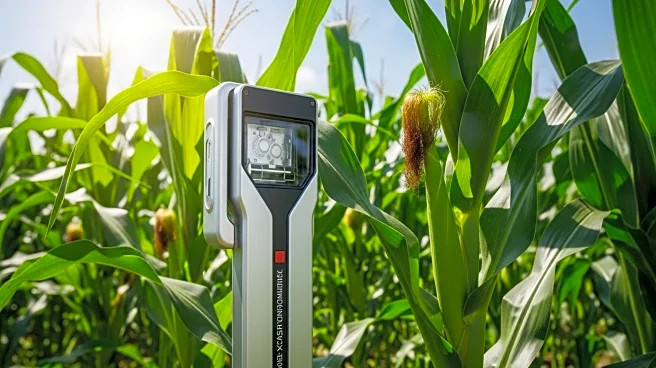What's Happening?
InnerPlant has achieved a groundbreaking milestone in agricultural technology with its CropVoice platform, which detected an active fungal infection in real-time for the first time in history. This detection occurred in July in northeast Nebraska, providing local farmers with a 4.5-week advantage to address the issue and protect their yields. The technology utilizes InnerSoy, a genetically engineered soybean that signals when under fungal attack, allowing farmers and agronomists to receive direct stress signals from the plants. This innovation was showcased at the Farm Progress Show, highlighting its potential to revolutionize crop management and enhance yield preservation.
Why It's Important?
The early detection of fungal infections in crops is crucial for farmers, as it allows them to implement timely interventions to prevent yield loss. This is particularly significant in the context of declining crop prices, such as corn, which has seen a substantial drop since its peak in 2022. By providing farmers with advanced warning, InnerPlant's technology can help mitigate economic challenges in rural America, where agriculture is a key industry. The ability to monitor crop health in real-time could lead to more efficient farming practices, reduced reliance on chemical treatments, and improved sustainability in agriculture.
What's Next?
Following the successful demonstration of CropVoice technology, InnerPlant may expand its application to other regions and crops, potentially offering broader benefits to the agricultural sector. Farmers and agronomists are likely to explore further integration of this technology into their crop management strategies. Additionally, ongoing research and development efforts may focus on enhancing the capabilities of InnerSoy and similar engineered crops to address other types of stressors, such as pests and environmental conditions. Stakeholders in the agricultural industry will be closely monitoring the impact of this technology on crop yields and economic outcomes.
Beyond the Headlines
The introduction of genetically engineered crops like InnerSoy raises important ethical and regulatory considerations. As these technologies become more prevalent, discussions around genetic modification, environmental impact, and food safety will likely intensify. The long-term implications of such innovations could reshape agricultural practices, influencing policy decisions and consumer perceptions. Furthermore, the success of CropVoice may encourage investment in similar technologies, driving advancements in precision agriculture and fostering a new era of data-driven farming.








